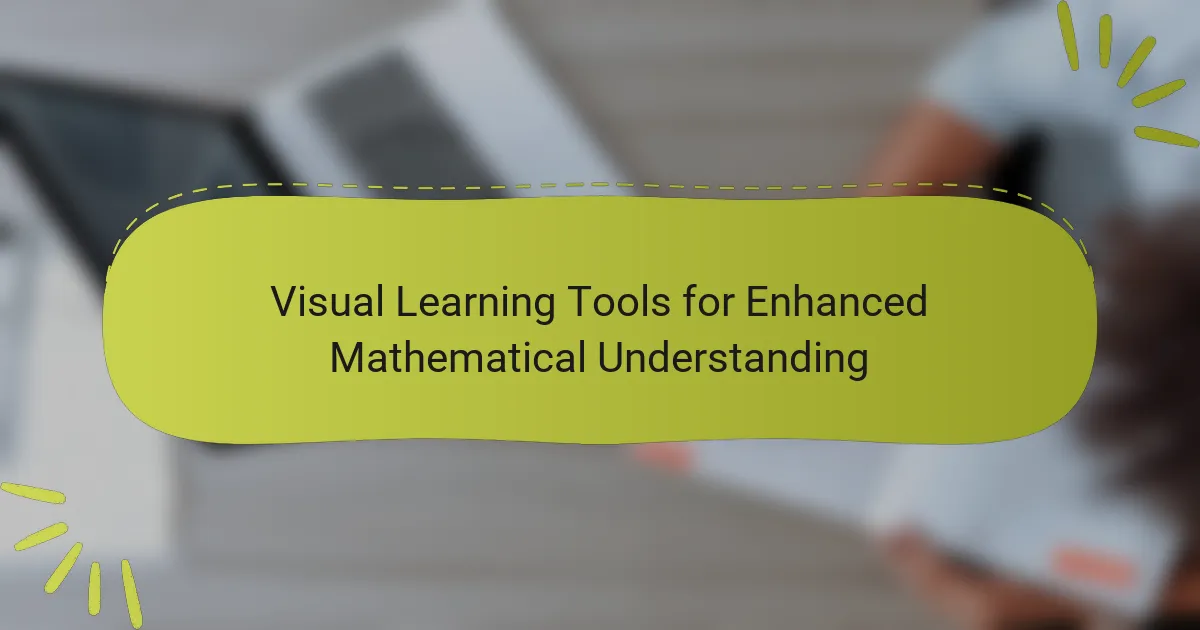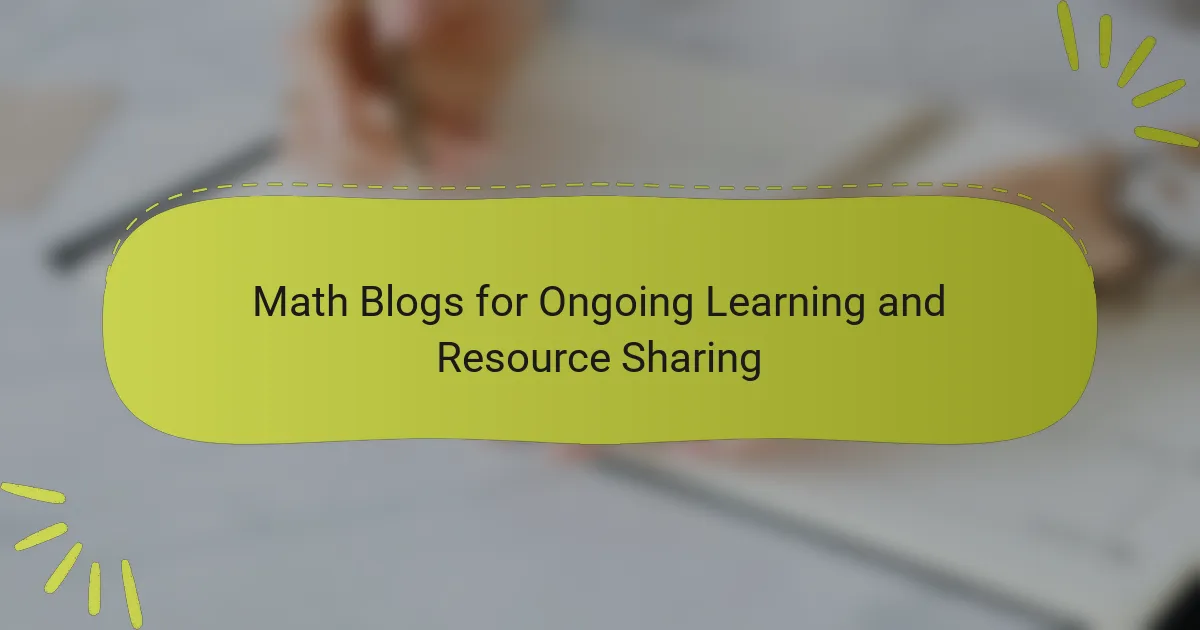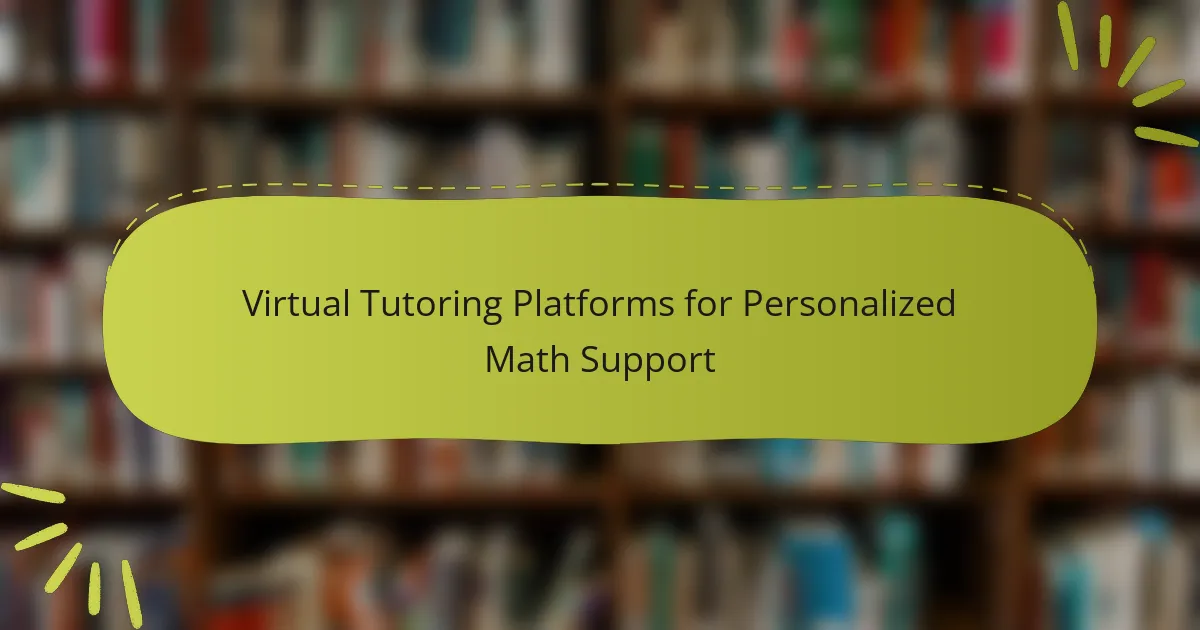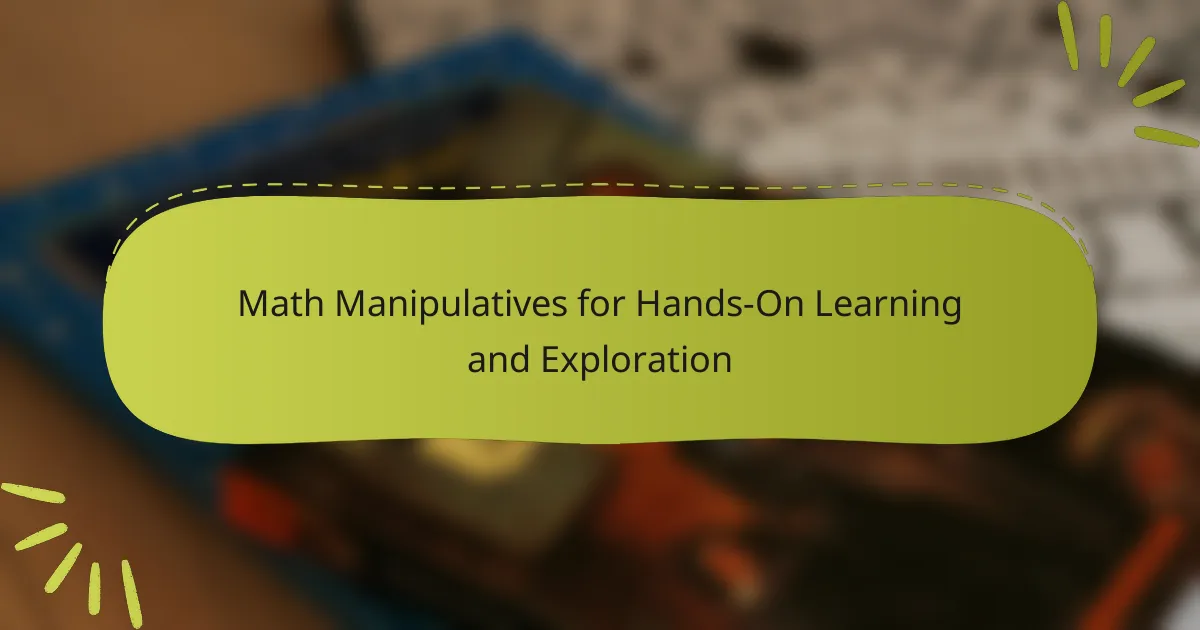Math competitions are structured events designed to challenge participants in solving mathematical problems, enhancing their skills and motivation. These competitions can take various forms, including individual, team, and online formats, with notable examples such as the American Mathematics Competitions (AMC) and Math Olympiads. Engaging in these events not only improves problem-solving and critical thinking abilities but also offers opportunities for recognition and academic advancement. Regular practice, mastery of fundamental concepts, and participation in collaborative learning environments are essential for success in these competitions. Additionally, effective time management and maintaining a positive mindset play crucial roles in achieving optimal performance.
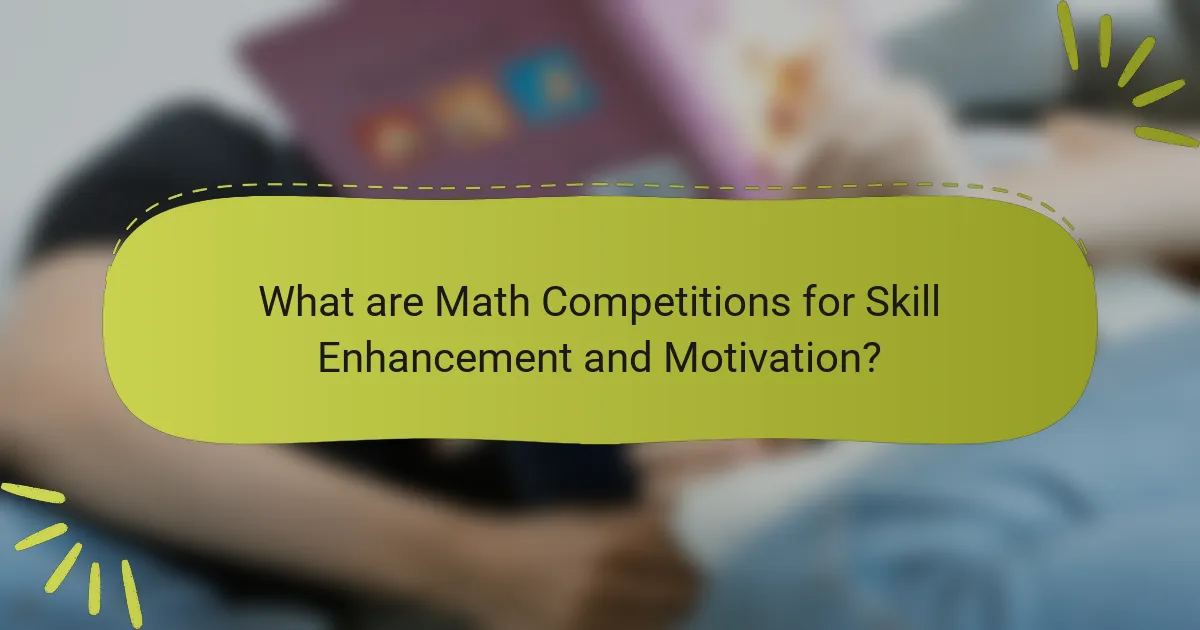
What are Math Competitions for Skill Enhancement and Motivation?
Math competitions are structured events that challenge participants to solve mathematical problems. These competitions aim to enhance mathematical skills and foster motivation among students. They often include various formats, such as individual or team-based challenges. Participants tackle problems that range in difficulty and cover diverse mathematical concepts. Engaging in these competitions can improve problem-solving abilities and critical thinking skills. Additionally, they provide opportunities for recognition and awards, further motivating students. Research shows that students involved in math competitions often perform better academically in mathematics. Competitions like the Math Olympiad and AMC are examples that illustrate the benefits of participation.
How do math competitions enhance student skills?
Math competitions enhance student skills by promoting critical thinking and problem-solving abilities. Participants engage with complex problems that require innovative solutions. This challenges students to think creatively and approach problems from different angles. Additionally, competitions foster time management skills as students must solve problems within strict time limits.
Research shows that students involved in math competitions often improve their mathematical reasoning and analytical skills. A study by the Mathematical Association of America found that students who participated in math contests scored higher on standardized tests. Moreover, collaboration with peers in preparation enhances teamwork and communication skills.
Overall, math competitions provide a structured environment for skill development and academic growth.
What specific skills can be developed through participation?
Participation in math competitions can develop critical thinking skills. These competitions require participants to analyze problems and devise strategies for solutions. Additionally, participants enhance their problem-solving abilities. They learn to approach complex mathematical challenges creatively and effectively. Time management skills are also cultivated. Contestants must solve problems within strict time limits. Furthermore, teamwork skills can be developed through group competitions. Collaborating with peers fosters communication and cooperation. Lastly, resilience is strengthened. Participants learn to cope with challenges and setbacks, which is essential in both math and life.
How do competitions motivate students to improve their math abilities?
Competitions motivate students to improve their math abilities by providing a structured environment for challenge and achievement. They create a sense of urgency and focus, encouraging students to prepare rigorously. The competitive nature fosters a drive to excel, as students aim to outperform peers. Additionally, recognition and awards serve as tangible incentives for improvement. Research shows that students participating in math competitions report increased interest and engagement in math. A study by the University of California found that competition enhances problem-solving skills and boosts confidence in mathematical abilities. Thus, competitions effectively stimulate a desire for mastery in math.
Why are math competitions important for educational growth?
Math competitions are important for educational growth because they enhance problem-solving skills and foster critical thinking. Participants engage in challenging mathematical scenarios that require innovative solutions. This experience builds resilience and perseverance in students. Research shows that students involved in math competitions often perform better academically. They develop teamwork skills through collaboration with peers. Competitions also boost self-confidence by providing opportunities for achievement. Furthermore, they stimulate interest in STEM fields, leading to potential career paths. Overall, math competitions serve as a catalyst for comprehensive educational development.
What role do math competitions play in fostering a love for mathematics?
Math competitions play a significant role in fostering a love for mathematics. They engage students in problem-solving and critical thinking. Competitions create an environment that encourages exploration and creativity in mathematical concepts. Participants often experience a sense of achievement through challenging problems. This achievement can lead to increased confidence in their mathematical abilities. Research shows that students involved in competitions often develop a deeper appreciation for math. For instance, a study by the Mathematical Association of America found that competition participants score higher in math assessments. Furthermore, the camaraderie among participants fosters a community that values mathematics.
How do they contribute to academic and personal development?
Math competitions contribute to academic and personal development by enhancing problem-solving skills and fostering critical thinking. Participants engage in challenging mathematical problems that require innovative solutions. This experience improves their analytical abilities and boosts their confidence in tackling complex tasks.
Additionally, math competitions promote teamwork and collaboration when students participate in group events. They learn to communicate effectively with peers and share ideas. Such interactions build social skills and create a sense of community among participants.
Research shows that students involved in math competitions often achieve higher academic performance in mathematics and related subjects. A study published in the Journal of Educational Psychology found that competitive environments can motivate students to excel academically.
Overall, math competitions serve as a platform for both intellectual growth and personal development, equipping students with valuable skills for future challenges.
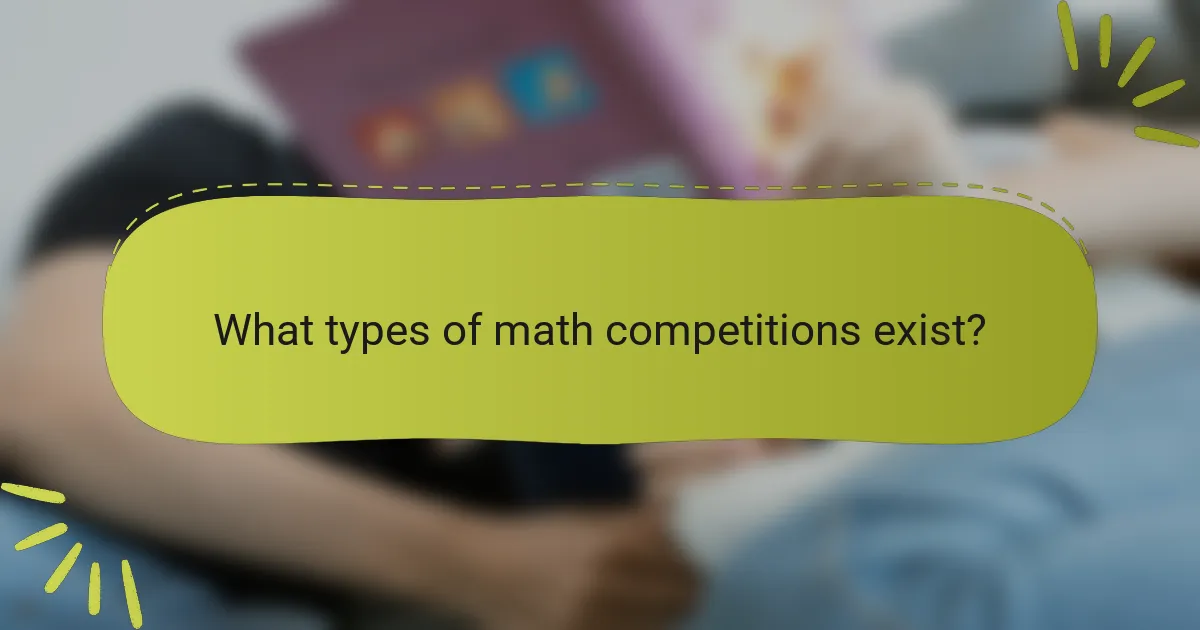
What types of math competitions exist?
Math competitions exist in various formats and levels. They include individual competitions, team competitions, and online competitions. Individual competitions focus on a single participant solving problems. Team competitions involve groups collaborating to solve mathematical challenges. Online competitions allow participants to compete remotely, often with time constraints.
Notable examples include the American Mathematics Competitions (AMC) and Math Olympiads. The AMC is a series of examinations for middle and high school students. Math Olympiads are international competitions for the most talented young mathematicians. These competitions foster problem-solving skills and mathematical reasoning. They also encourage collaboration and critical thinking among participants.
How do different formats of competitions affect participant engagement?
Different formats of competitions significantly affect participant engagement. For instance, individual competitions often foster a high level of personal accountability. Participants may feel more motivated to perform well when their success is solely dependent on their own efforts. In contrast, team competitions promote collaboration and communication among participants. This can enhance engagement through shared goals and collective problem-solving.
Research shows that varied competition formats can cater to different learning styles. For example, a study by the Educational Testing Service found that group-based formats increased participation rates by 30% compared to individual formats. Additionally, competitions with dynamic structures, such as rounds or eliminations, can maintain excitement and prolong interest. Engaging formats that include real-time feedback also help participants stay involved.
Overall, the design of competition formats plays a crucial role in shaping the level of engagement among participants.
What are the differences between individual and team competitions?
Individual competitions involve participants competing alone, relying solely on their skills and knowledge. Team competitions require participants to work collaboratively, combining their strengths to achieve a common goal. In individual competitions, performance is based on personal achievement, while in team competitions, success depends on group dynamics and teamwork. Individual competitions often emphasize self-reliance and personal accountability, whereas team competitions foster collaboration and communication skills. The scoring systems also differ; individual competitions typically award points based on personal performance, while team competitions aggregate scores from all members. This distinction affects the strategies employed, with individuals focusing on personal tactics and teams developing collective strategies.
How do online competitions compare to in-person events?
Online competitions differ from in-person events primarily in accessibility and engagement. Online competitions allow participants from diverse locations to join without travel constraints. This increases the number of participants significantly. In-person events often foster a stronger sense of community and collaboration among competitors. Participants can interact face-to-face, enhancing networking opportunities.
Research shows that in-person events can lead to higher motivation levels due to the competitive atmosphere. A study by the University of California found that in-person participants reported increased satisfaction and engagement compared to online counterparts. However, online competitions offer flexibility in scheduling and can be more convenient for participants with time constraints.
Overall, both formats have unique advantages and disadvantages that cater to different preferences and circumstances.
What age groups participate in math competitions?
Math competitions typically involve participants from various age groups. Commonly, these age groups include elementary school students, middle school students, and high school students.
Elementary school participants are usually between the ages of 6 and 12. Middle school competitors generally range from 11 to 14 years old. High school participants typically fall within the ages of 14 to 18.
Some competitions also include college-level participants, who are usually 18 years and older. Additionally, certain contests have divisions for younger children, sometimes as young as 5 years old.
These age groups reflect the structure of many math competitions, such as the Math Olympiad and local math leagues. Such competitions are designed to cater to the varying skill levels and knowledge bases of these age categories.
What are the common age categories for math competitions?
Common age categories for math competitions include elementary, middle school, high school, and college levels. Elementary competitions typically cater to students aged 5 to 12 years. Middle school competitions usually involve participants aged 11 to 14 years. High school competitions are designed for students aged 14 to 18 years. College-level competitions target individuals aged 18 and older. These categories help organize participants based on their educational stages for fair competition.
How do competition levels vary by age group?
Competition levels in math vary significantly by age group. Younger participants, typically in elementary school, often experience a more supportive and less intense competitive environment. As students progress to middle school, competition levels increase due to a greater focus on achievement and performance. High school competitions tend to be the most rigorous, as students prepare for college and advanced studies.
Statistics show that participation in math competitions peaks during high school. According to the Math Olympiad data, over 50% of participants are high school students. In contrast, elementary students represent only about 20% of participants.
This trend indicates that as students age, their motivation and the stakes of competition rise, leading to higher competition levels in older age groups.
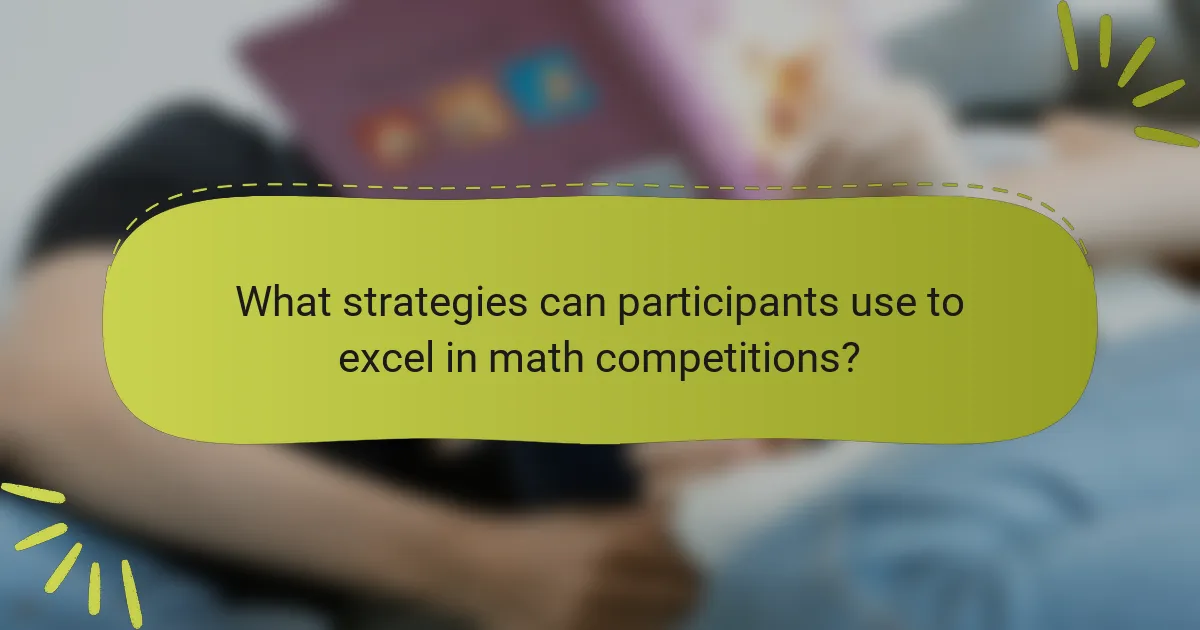
What strategies can participants use to excel in math competitions?
Participants can excel in math competitions by practicing regularly and mastering key concepts. Regular practice helps develop problem-solving skills and speed. Participants should focus on understanding fundamental theories and techniques. This includes algebra, geometry, and number theory.
Additionally, solving past competition problems is crucial. It familiarizes participants with question formats and difficulty levels. Time management during competitions is also essential. Participants should practice pacing themselves to complete all questions.
Joining math clubs or study groups can enhance learning. Collaboration with peers can provide different perspectives on problem-solving. Finally, maintaining a positive mindset is important. Confidence can significantly impact performance during competitions.
How can participants effectively prepare for math competitions?
Participants can effectively prepare for math competitions by practicing regularly and studying key concepts. Regular practice helps build problem-solving skills and familiarity with competition formats. Participants should focus on topics commonly tested, such as algebra, geometry, and number theory.
Utilizing resources like past competition papers can provide insight into question types and difficulty levels. Joining study groups allows for collaborative learning and exposure to different problem-solving approaches. Additionally, participants can benefit from online platforms that offer practice problems and instructional videos.
Time management during practice sessions is crucial. Setting specific goals for each study session can enhance focus and productivity. Finally, simulating competition conditions by timing practice tests can help participants manage anxiety and improve performance under pressure.
What resources are available for practice and preparation?
Various resources are available for practice and preparation in math competitions. Online platforms like Art of Problem Solving (AoPS) offer comprehensive courses and problem sets. Books such as “The Art and Craft of Problem Solving” by Paul Zeitz provide valuable insights and strategies. Local math clubs often organize practice sessions and mock competitions. Additionally, past competition papers from organizations like AMC and Math Olympiad serve as excellent practice material. Websites like Brilliant.org also offer interactive problem-solving opportunities. These resources collectively enhance skills and boost confidence for participants.
How important is teamwork in preparation for team competitions?
Teamwork is crucial in preparation for team competitions. It fosters collaboration among team members. Effective communication enhances problem-solving abilities. Sharing diverse perspectives leads to innovative solutions. Studies show that teams with strong cohesion perform better. For example, a report by the American Psychological Association highlights that collaborative teams achieve higher results. Teamwork also builds trust and accountability. This creates a supportive environment for skill enhancement. Overall, teamwork significantly contributes to success in team competitions.
What common challenges do participants face in math competitions?
Participants in math competitions commonly face time management issues. Many competitions have strict time limits that pressure participants to solve problems quickly. This can lead to mistakes due to rushing. Additionally, participants often encounter unfamiliar problem types. Competitions frequently include advanced topics not covered in standard curricula. This can create anxiety and hinder performance. Another challenge is the high level of competition. Participants may feel intimidated by peers with more experience or higher skill levels. Lastly, stress and pressure can negatively impact focus and clarity during the competition. These factors collectively contribute to the difficulties faced by participants.
How can participants overcome anxiety during competitions?
Participants can overcome anxiety during competitions by employing various techniques. Deep breathing exercises can help calm nerves and reduce anxiety levels. Visualization techniques, where participants imagine themselves succeeding, can boost confidence. Regular practice and preparation also contribute to feeling more secure. Setting realistic goals helps manage expectations and reduces pressure. Positive self-talk can replace negative thoughts and enhance performance. Engaging in physical activity before the competition can alleviate stress. Research indicates that these methods are effective in reducing anxiety and improving focus during competitive events.
What strategies can help in managing time effectively during contests?
Prioritizing tasks is a key strategy for managing time effectively during contests. Contestants should analyze the problems and categorize them by difficulty. Tackling easier problems first can build confidence and secure quick points. Allocating specific time limits for each problem helps maintain pace. Regularly checking the remaining time ensures contestants stay on track. Utilizing scratch paper for calculations can streamline the thought process. Lastly, practicing under timed conditions can enhance speed and efficiency. These strategies collectively contribute to better time management in competitive settings.
What are some best practices for success in math competitions?
Practice regularly to enhance problem-solving skills. Regular practice helps in familiarizing with different types of problems. Study previous competition papers to understand question formats. Analyzing past problems aids in identifying common themes. Join study groups to collaborate with peers. Collaboration fosters diverse approaches to problem-solving. Focus on time management during practice sessions. Effective time management is crucial in competition settings. Learn advanced mathematical concepts relevant to competitions. Advanced knowledge can provide an edge over competitors. Develop a strategic approach to tackling problems. A strategic mindset can lead to more efficient solutions.
Math competitions are structured events designed to enhance mathematical skills and motivate students through problem-solving challenges. These competitions vary in format, including individual, team-based, and online formats, catering to participants from elementary to college levels. Key benefits of participation include improved critical thinking, problem-solving abilities, and academic performance, as well as the development of teamwork and resilience. The article explores the importance of math competitions in fostering a love for mathematics, the strategies for effective preparation, and the common challenges participants face, providing a comprehensive overview of their role in educational growth.
